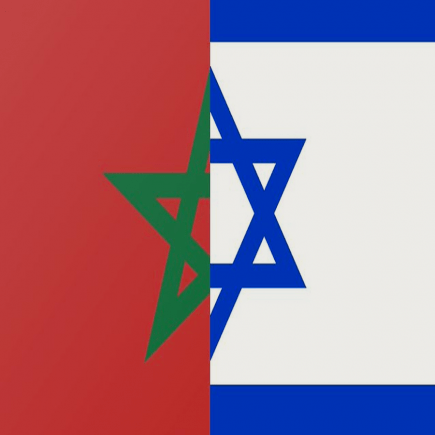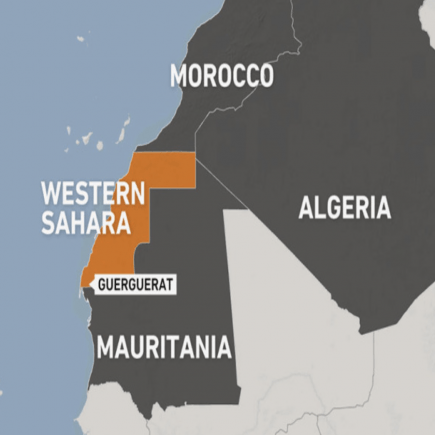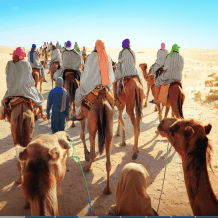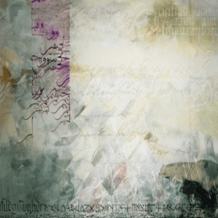
Israel and Morocco have agreed to normalize relations, the most recent pact in past months between Israel and Arab countries in the Middle East and Africa. US President Donald J. Trump announced on Thursday, December 10th, 2020 that Morocco will become the fourth nation to normalize relations with the Jewish state of Israel this year, making another breakthrough for US diplomacy just weeks before Trump’s term as president ends. Moroccan King Mohammed VI said his country would “resume official contacts… and diplomatic relations with minimal delay.” with Israel, according to a statement from the royal palace.
President Trump tweeted on Thursday: “Another history breakthrough today! Our two great friends Israel and the Kingdom of Morocco have agreed to full diplomatic relations – a massive breakthrough for peace in the Middle East!” Jared Kushner, Trump’s son-in-law, and senior adviser said, “This recognition will strengthen America’s relationship with Morocco. It recognizes the inevitable.”
In an apparent quid pro quo for Morocco’s diplomatic opening to Israel, Trump also said he signed a proclamation recognizing Moroccan sovereignty over Western Sahara “Morocco’s serious, credible, and realistic autonomy proposal is the only basis for a just and lasting solution for enduring peace and prosperity!” the president tweeted.
Israeli Prime Minister Benjamin Netanyahu hailed the agreement as “historic,” calling it “another great light of peace” in the region. “I’ve always believed that this historic day would come,” Netanyahu said, before lighting a candle for the Jewish Festival of Lights, Hanukkah, which began Thursday.

Israeli Prime Minister Benjamin Netanyahu thanked Trump “for his extraordinary efforts to expand peace, to bring peace to Israel and the peoples of the Middle East.” The Israeli leader also thanked Morocco’s King Mohammed VI “for taking this historic decision to bring a historic peace between us.” Netanyahu said their nations “have had a warm relationship” and would be working to establish full diplomatic relations and begin flights between the two countries.
Giving the strong historical ties that unite the Jewish community of Moroccan origin, including in Israel, to the person of His Majesty the King, the Sovereign informed the U.S. President that Morocco intends:
– To grant authorizations for direct flights for the transportation of members of the Moroccan Jewish community and Israeli tourists to and from Morocco
– Resume official contacts with counterparts and diplomatic relations as soon as possible
– Promote innovative relations in the economic and technological fields, including working to reopen liaison offices in both countries, as was the case previously and for several years until 2002
Netanyahu and Mohammed VI both raised the prospect of resuming direct flights between the countries and the opening of diplomatic missions. In September, Netanyahu and representatives of Bahrain and the United Arab Emirates officially normalized relations, signing diplomatic agreements during a White House ceremony that was hosted by Trump. The Trump administration had also brokered those deals.
Morocco is the fourth latest state to make such a deal with Israel. Agreements have also been struck recently with the United Arab Emirates, Bahrain, and Sudan. Along with Egypt and Jordan, Morocco becomes the sixth Arab League member to normalize ties with Israel.
Egypt, the UAE, and Bahrain issued statements welcoming the deal between Morocco and Israel. However, Palestinian officials say the series of deals has come at the expense of their hopes for an independent state. They have long urged Arab countries to withhold ties with Israel until Israel and the Palestinians reach a final peace agreement. Bassam as-Salhi, a member of the Palestine Liberation Organization’s Executive Committee, condemned the pact. “Any Arab retreat from the [2002] Arab peace initiative, which stipulates that normalization comes only after Israel ends its occupation of Palestinian and Arab lands, is unacceptable and increases Israel’s belligerence and its denial of the Palestinian people’s rights,” Salhi told news agency Reuters.
In Gaza, Hazem Qassem, spokesman for the ruling Islamist group Hamas, was equally critical. He said: “This is a sin and it doesn’t serve the Palestinian people. The Israeli occupation uses every new normalization to increase its aggression against the Palestinian people and increase its settlement expansion.” In this regard, Morocco’s king said the “measures do not in any manner affect Morocco’s ongoing and sustained commitment to the just Palestinian cause.”, a royal statement said.
The statement added that the king had spoken with Palestinian Authority President Mahmoud Abbas and assured him that he “would never relinquish his role in defending the legitimate rights of the Palestinian people.” It said the king had reiterated his support for a two-state solution. His Majesty the King referred to the consistent and balanced positions of the Kingdom of Morocco on the Palestinian question, stressing that Morocco supports a solution of two states living side-by-side in peace and security and that negotiation between the Palestinian and Israeli sides remain the only way to achieve a final, lasting and comprehensive settlement of this conflict.
In his capacity as Chairman of the Al-Quds Committee of the Organization of Islamic Cooperation, His Majesty the King underlined the need to preserve the special status of this city. The Sovereign also insisted on the respect of the freedom to practice religious rites for the followers of the three monotheistic religions, as well as the respect of the Islamic character of Al-Quds Asharif and Al-Aqsa Mosque, in accordance with the Al-Quds/Jerusalem Call signed by His Majesty the King, Commander of the Faithful, and His Holiness Pope Francis, during his visit to Rabat on March 30, 2019.

His Majesty the King makes it clear that these measures affect in no way Morocco’s permanent and sustained commitment to the just Palestinian cause and its determination to continue to contribute effectively and constructively to a just and lasting peace in the Middle East. Responding to the latest announcement, Sidi Omar, the Polisario Front’s representative to the UN, said Western Sahara’s “legal status is determined by international law and UN resolutions.” “The move shows that Morocco’s regime is willing to sell its soul to maintain its illegal occupation of parts of Western Sahara.” he wrote on Twitter.
The group’s Europe representative, Oubi Bchraya, said the change in US policy “will not change an inch of the reality of the conflict and the right of the people of Western Sahara to self-determination.” Reuters reports. Last month, the Polisario Front said the three-decades-old ceasefire had been ended by a Moroccan military operation in a buffer zone.
Lotfi Bouchaara, Morocco’s ambassador to Moscow, told the BBC’s Focus on Africa program that Morocco did not breach the ceasefire but that its military was responding to a provocation by Polisario fighters who had blocked a key road to Mauritania. Morocco had reacted with “restraint”, he said. Media caption Western Sahara: Forty years in a refugee camp.
Trump has also tweeted: “Morocco recognized the United States in 1777. It is thus fitting we recognize their sovereignty over Western Sahara.” The White House said the US would recognize Morocco’s claim over Western Sahara as part of the deal.
In a phone call with the Moroccan king, Mr. Trump “reaffirmed his support for Morocco’s serious, credible, and realistic autonomy proposal as the only basis for a just and lasting solution to the dispute over the Western Sahara territory and as such the president recognized Moroccan sovereignty over the entire Western Sahara territory.” the White House said.
A White House proclamation on Thursday said the US believed that an independent Sahrawi State is “not a realistic option for resolving the conflict and that genuine autonomy under Moroccan sovereignty is the only feasible solution.”
Below are how the Atlantic Council experts react to the deal between Israel, Morocco, and the United States, and what it means for the wider MENA region:
Morocco can claim victory, but potential conflict looms:
“The announcement of the normalization of relations between the Kingdom of Morocco and the state of Israel is another positive step toward decreasing tensions in the MENA region, at least on the surface. The quid pro quo in this latest case, nevertheless, casts doubt on the agreement’s ability to achieve de-escalation, since the terms might well ignite a new conflict. In fact, with his recognition of Moroccan sovereignty over the Western Sahara territory, President Trump may provoke an armed reaction by the Polisario Front in Western Sahara, and by its supporter, the Algerian state. Tensions in the area have been on the rise for some time, but this event may accelerate a renewed clash between the two Maghrebi states. In other words, this normalization in exchange for recognition of Moroccan claims over Western Sahara will be a success for the Moroccan monarchy if it does not plunge it into a military confrontation with Algeria.”
Karim Mezran director of the North Africa Initiative and a resident senior fellow with the Rafik Hariri Center and the Middle East Programs.
The deal will not bring the region any closer to peace:
“The agreement is yet another transactional deal that benefits the leaders of the United States, Israel, and Morocco over a piece of land that does not belong to them. Once again, Trump cedes territory (an executive action on his part without any debate in Congress) which he does not own without even a discussion with, let alone with an agreement from, the Sahrawi people who have fought long and hard for self-determination. In the end, the King of Morocco revived a diplomatic relationship that his father had established after the 1994 Casablanca conference.”
“Trump has once again disregarded three decades of US and UN diplomacy that sought via referendum and consultation to come to a peaceful resolution of the Western Sahara dispute. This decision was made on the day the world is supposed to celebrate international human rights. In the name of peace (inadequate though it may be) harm was done to yet another indigenous people, and it will not bring the people of the region any closer to genuine peace.”
Nabeel Khoury, nonresident senior fellow in the Atlantic Council’s Middle East programs.
The deal could give the Moroccan king new leverage:
“Peace between Morocco and Israel is a welcome addition to the Abraham Accords. The announcement is not surprising: ties between Israel and Morocco have been relatively strong for decades. Morocco was a one-time hub of Jewish life in the region and the King has increasingly embraced Jewish Moroccan heritage, naming senior Jewish advisers to his government and, most recently, incorporating Moroccan Jewish history into school curricula. There is already more than $30 million in annual trade between the two countries, tens of thousands of Israelis travel to Morocco annually, and Israelis from Morocco can already retain Moroccan citizenship.”
“The deal is expected to also include US recognition of Moroccan control over Western Sahara—which Morocco has sought for half a century. After seven successive US presidents insisted on neutrality, such an offer from Trump, no matter how short-lived, is surely too great to pass upon.”
“The Palestinians will undoubtedly feel deeply betrayed by the announcement, particularly given widespread Moroccan support for the Palestinian cause. But Morocco has helped lead Arab peace initiatives with Israel in the past, and the King has used his seat as chair of the Al-Quds Committee of the Organization of Islamic Cooperation to advocate for a Palestinian State in the past. The agreement could give the King further leverage to advance Palestinian issues—should he choose to use it.”
Carmiel Arbit, nonresident senior fellow in the Atlantic Council’s Middle East programs.
Another political win for Netanyahu before Biden takes over:
“The announcement of Morocco’s plans to normalize its ties with Israel—with which it has a long history of “on-again, off again” relations —comes on the heels of similar deals involving the UAE, Bahrain, and Sudan. It offers the latest representative example of President Donald Trump’s original paradigm for peace between Israel and the Arab world. Turning conventional wisdom on its head, Trump has refuted the previous assumption that Israel’s integration into the Middle East would be achieved only through the resolution of its conflict with the Palestinians, instead of employing the leverage of American largesse—e.g. sophisticated weaponry to Abu Dhabi, removal from the State Department’s list of terrorist sponsors for Khartoum and now, recognition of Rabat’s claim to Western Sahara—to incentivize Arab leaders into accepting Israel as their diplomatic partner. The success of this approach is self-evident.”
“Netanyahu, who has been a famous backer of Trump and (most of) his foreign policy initiatives, is reaping the fruits of his enthusiastic investment in the outgoing administration. The Israeli prime minister’s deferential attitude toward Trump—extending also to the Israeli government’s muted congratulations for President-elect Joe Biden and open criticism of his intention to reverse Trump’s rejection of the nuclear deal with Iran—continues now to deliver gains for Israel from the current president who, in the twilight of his tenure, is eager to add notches to his belt, most particularly ones which appeal to the conservative and religiously devout constituency upon whose support he would depend in mounting an anticipated bid to recapture the White House.”
“This window may be closing. With the Biden administration less likely to submit to these kinds of quid pro quos, and few among Israel’s center-right majority inclined toward compromise with the Palestinians, it remains to be seen whether conditions will induce other Arab nations to jump on the bandwagon of normalization with Israel after January 20.”
Shalom Lipner, nonresident fellow in the Atlantic Council’s Middle East programs.
Mideast deal-making is one of Trump’s legacies:
“The news should be analyzed in the context of Trump administration’s transactional foreign policy. Over the past few months, and having failed to achieve any success with regards to US policy toward North Korea or Iran, the Trump administration seems to have focused itself on convincing Muslim majority countries with no democratic institutions to establish relations with Israel, in return for either weapons or more recognition from the United States. The Trump administration can sell this as a foreign policy achievement and, upon leaving office, can be viewed as his foreign policy legacy.”
Sina Azodi, nonresident fellow in the Atlantic Council’s Middle East programs.
A great deal for Morocco, but complications remain:
“The United States is recognizing Moroccan claims over the disputed territory of Western Sahara and weighing in on one of the longest-running frozen conflicts in the world in exchange for Rabat committing to normalize relations with a country with which it has never been at war and with which it has had secret relations for decades. Israeli passport holders have been able to visit Morocco for years, obtaining visas on arrival.”
“This is a great deal for Morocco, but one that complicates longstanding efforts to resolve the dispute over Western Sahara. It is also a deal that could easily damage relations between Washington and Morocco’s well-armed gas- and oil-rich neighbor, Algeria, which hosts the Sahrawi rebels of the Polisario Front. Many countries of the world recognize Sahrawi rule over at least part of the disputed phosphate-rich territory.”
Borzou Daraghi, a nonresident senior fellow with the Atlantic Council’s Middle East programs.
Don’t expect any more deals soon
“As predicted in September, a normalization agreement has now been signed between Morocco and Israel. But there may not be many more such agreements. Governments strongly influenced by Iran (Iraq and Syria) and Hezbollah (Lebanon) will not normalize relations with Israel. Algeria probably would not have any way, but it definitely will not do so now that the Trump administration has sided with its rival Morocco over Western Sahara. Such a move would also be difficult for Tunisia and Kuwait which are more constrained by public opinion than other Arab governments. King Salman has made it known that he opposes such a move by Saudi Arabia, and Qatar has indicated that it will not enter into such an agreement either. Oman seems to be the most likely prospect for normalizing relations with Israel, but it may be content with the current status quo of quiet cooperation with the Jewish state.”
Mark N. Katz, a nonresident senior fellow with the Atlantic Council’s Middle East programs.
A nightmare for Palestinians:
“For Palestinians, President Donald Trump’s departure from the White House can’t come soon enough. Morocco’s decision to restore and upgrade diplomatic relations with Israel showed that Palestinian Authority President Mahmoud Abbas’s nightmare hasn’t ended with the election of a far more sympathetic Joe Biden. Indeed, Trump predicts more governments will soon break ranks with Abbas and join the wave of Arab states warming up to Israel.”
“Like the United Arab Emirates, Bahrain, and Sudan, which have normalized ties with Israel since September, Morocco’s King Mohammed VI professed deep concern for the Palestinians and pledged to work harder for a comprehensive Middle East peace agreement. In Ramallah, they weren’t reassured. Former Palestinian negotiator Hanan Ashrawi condemned the deal in a tweet saying: “Between bribery and blackmail, the Trump administration is in a mad scramble to extract concessions and benefits for Israel before the new administration takes over.”
“Even under Biden, Palestinians have slim hopes for getting what they want. While the president-elect may restore hundreds of millions in aid money that Trump cut off and allow Palestinians to reopen their shuttered representative office in Washington, the US Embassy that was moved from Tel Aviv to Jerusalem will stay put despite Palestinian protests over the city’s political status. To the Palestinians’ disappointment, Biden has praised the new willingness of Arab states to come to terms with Israel and will certainly encourage the trend as he takes over the reins of Middle East policy in Washington next month.”
Jonathan Ferziger, a nonresident senior fellow with the Atlantic Council’s Middle East programs.





